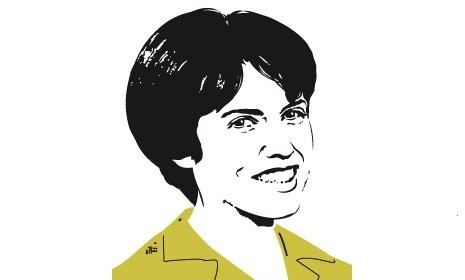Three cheers for Christiane Amanpour
Christiane Amanpour, the capital's newest talking head, has been roundly abused for lacking insider status. But she has something more important

A free daily email with the biggest news stories of the day – and the best features from TheWeek.com
You are now subscribed
Your newsletter sign-up was successful
For all I know, Christiane Amanpour could be the most craven, cutthroat shrew in the history of the network diva. As the new host of ABC’s This Week, she might turn out to be the biggest news-babe disaster since Face to Face With Connie Chung. But as the replacement for George Stephanapoulos in the Sunday-morning slot, Amanpour is an inspired and inspiring choice, and I heartily hope she succeeds.
Washington Post critic Tom Shales evidently wishes otherwise. In a blistering critique of Amanpour's debut, Shales objected to the shape of the table around which guests were seated. He chafed at the excessive fanfare with which the arriving “duchess” was heralded. He opposed the pre-taping of major interviews on what ought to be a live television-news broadcast.
Fair enough.
The Week
Escape your echo chamber. Get the facts behind the news, plus analysis from multiple perspectives.

Sign up for The Week's Free Newsletters
From our morning news briefing to a weekly Good News Newsletter, get the best of The Week delivered directly to your inbox.
From our morning news briefing to a weekly Good News Newsletter, get the best of The Week delivered directly to your inbox.
But Shales' central grievance is the most difficult to fathom: He bemoans the placement of a seasoned foreign-affairs reporter at the helm of “a broadcast that for three decades has dealt primarily with domestic politics, policies and culture.”
The political world is bigger than the Beltway.
Shales is not the only prominent critic to opine that Amanpour is insufficiently versed in inside-the-Beltway political baseball to host a program aimed at the kind of people who’ve memorized the batting averages and collect all the cards. But given that America's predominant role in the world has long been paired with Americans' collective unfamiliarity with the world, it’s a little bizarre to lament the possibility that a Sunday morning talk show might focus on foreign policy at the expense of (still more) punditry on domestic politics. It's one thing if the public proves bored or turned off by such a show, driving ratings down and the network back to safer territory. But to dismiss it from the get-go? On principle?
Since when is it an inviolate tenet of journalism to have four out of four major network current-affairs shows dedicated strictly to inside-the-Beltway maneuvering? Okay, “ever since the Sunday shows have been on” is probably the answer to that question. So let's ask another one: Now that the U.S. finds itself in hot wars in Iraq and Afghanistan, arguably headed toward cold ones with China and Russia, and on an ever more uneven keel with scary states such as Pakistan and Iran — where, incidentally, Amanpour was partly raised, and has occasionally worked — is it such a bad idea to give one of the four Sunday slots to someone who’s spent more time in foreign trouble spots than on presidential campaign planes?
A free daily email with the biggest news stories of the day – and the best features from TheWeek.com
On the contrary. It is an increasingly costly error to segregate foreign and domestic expertise into such neat little boxes. Perhaps the most underpopulated journalistic beat of our time is also one of the most important: the intersection between U.S. domestic political pressures and their consequences around the world. Washington is full of journalists who have the first part down cold, but have zero sense of the second.
Week in and week out, American politicians treat international issues, from the regulation of trade to the waging of war, as functions of domestic politics, ignoring the real-life impact of their favored policies on anyone who doesn’t vote in U.S. elections and on America’s own global prospects -- a serious error, even from a solely American perspective. It’s not hard to get away with such a blinkered approach, because the journalists who interview them see everything through the same narrow prism.
All too often, the average Sunday show guest’s analysis of Israel and the Palestinians is a knee-jerk function of whether he or she represents New York (Israel does no wrong) or Michigan (hold on there – I’ve got Arabs in my district!) Whether a given politician is gung-ho for or dead set against a fuller relationship with China can depend on how this wind-turbine deal or that tire tariff affects employment in a single congressional district.
Americans aren’t the only ones routinely allowed to skate or scam on the nation’s most prestigious journalism programs. Foreign leaders and commentators are afforded a ridiculous amount of credibility based solely on the fact that they can speak good English on T.V. Remember media darling Ahmad Chalabi, America’s pick to save postwar Iraq? He was great with sound bites, and undoubtedly suave at Georgetown cocktail parties. Unfortunately, few knew enough to tell us that Chalabi was also roundly distrusted and detested at every level of Iraqi society – a fact that any journalist could have figured out with half a day’s reporting on the ground. How many of those Sunday talking heads have amassed half a day’s reporting in Baghdad or Tehran or Beijing recently?
No question, Christiane Amanpour is at a disadvantage to her competitors in terms of Washington political experience. But with all due respect to the Gridiron Club, the D.C. dialect is not so difficult that a smart person can't pick it up. Sure, Amanpour should make every effort to become fluent in Beltwayese. But she should definitely keep the international accent.